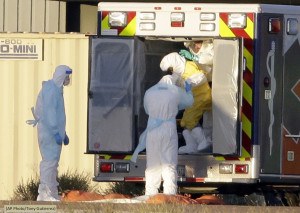Kimberly-Clark Corp. was accused in a lawsuit by a Los Angeles surgeon of putting its “monetary self interest” ahead of public safety by falsely claiming its medical gowns protect against Ebola when it knew they didn’t.
Ebola has infected more than 13,000 people in Africa, killing more than 4,900. In the U.S., one man who traveled from Liberia to Dallas died and two of the nurses who treated him became infected. The U.S. is requiring monitoring of people traveling from affected countries while New York and New Jersey have imposed quarantines.
Kimberly-Clark has known since at least last year that its Microcool Breathable High Performance Surgical Gowns won’t protect against infectious diseases including Ebola and continued to market them anyway, Hrayr Shahinian, a skull base surgeon, said in his complaint in Los Angeles federal court.
“KC’s recklessness and indifference to the prospect that it is responsible for placing patients and health care professionals at great and unnecessary risk of infection and bodily harm is nothing short of astonishing and, more to the point, utterly reprehensible,” Shahinian said in the filing yesterday.
“The company stands behind the safety and efficacy of our products,” said Bob Brand, a spokesman for Dallas-based Kimberly-Clark, declining further comment.
$500 Million
Shahinian, who is seeking more than $500 million in damages, doesn’t claim he contracted the deadly illness, only that he “made use” of the gowns in question. The fraud suit was filed as a proposed class action on behalf of buyers and users of the gowns.
Shahinian, born in Beirut and raised in Paris, studied at the American University of Beirut, Pritzker Medical School at the University of Chicago and completed a fellowship on skull base surgery at the University of Zurich, according to a profile at the Skull Base Institute.
He uses micro-instruments, along with fiber optic, high- definition video, to access problem areas of the brain, avoiding traditional craniotomy, which requires sawing off the top portion of the skull to access the brain, according to the website.
Kimberly-Clark markets the gowns as impermeable even though the products failed industry tests, Shahinian said in the complaint. Last year, tests of the company’s gowns revealed that they allowed “liquid and bacterial and viral pathogens” to penetrate the garments thus putting health-care workers and patients at risk, according to the complaint.
Not Advised
The company should have recalled the gowns, alerted federal and state officials, the U.S. Food and Drug Administration and physicians and health-care staff, Shahinian said.
Ebola, which was first identified in 1976 near the Ebola River in what is now the Democratic Republic of Congo, jumps to humans through contact with secretions from animals such as chimpanzees, gorillas and bats. The virus spreads among humans the same way, with medical workers and family members the most at risk.

The latest epidemic has killed more people than all previous waves of the disease combined and has spread, for the first time, beyond Africa. In Spain, a medical worker was infected and died after caring for people who had contracted Ebola in Africa. Ebola patients have also been treated in Norway, Germany and France.
Craig Spencer, a 33-year-old New York City emergency-room doctor, tested positive for Ebola Oct. 23 after returning from aid work in Guinea. Spencer is in serious condition at Bellevue Hospital Center in New York.
Eight people have completed treatment for Ebola in the U.S. Thomas Eric Duncan, a Liberian national, died after being treated for the disease in a Dallas hospital.
Two nurses who were infected while caring for Duncan have both recovered. Doctors for Amber Vinson, one of the nurses discharged yesterday, said the 29-year-old benefited from youth and protective gear that partially protected her from Duncan’s bodily fluids.
The case is Shahinian v. Kimberly-Clark Corp., 14-cv-08390, U.S. District Court, Central District of California (Los Angeles)
AP PHOTO





















 20,000 AI Users at Travelers Prep for Innovation 2.0; Claims Call Centers Cut
20,000 AI Users at Travelers Prep for Innovation 2.0; Claims Call Centers Cut  Preparing for an AI Native Future
Preparing for an AI Native Future  AIG, Chubb Can’t Use ‘Bump-Up’ Provision in D&O Policy to Avoid Coverage
AIG, Chubb Can’t Use ‘Bump-Up’ Provision in D&O Policy to Avoid Coverage  Insurance Groundhogs Warming Up to Market Changes
Insurance Groundhogs Warming Up to Market Changes 











